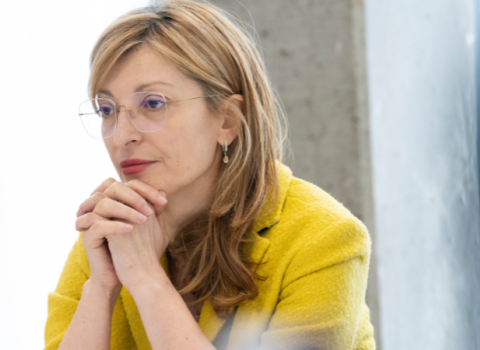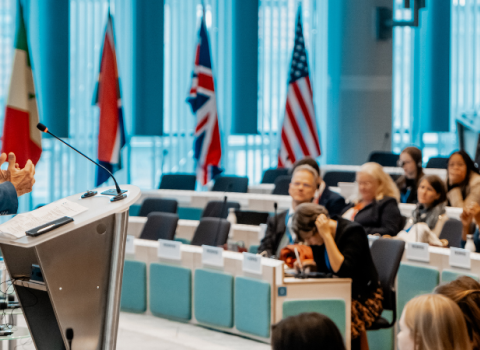The European Commission named a panel of 15 top innovation advisors to suggest better ways to spend its €2.5 billion innovation budget and pave the way to a new European Innovation Council (EIC).
The group includes Cambridge’s best-known venture capitalist, Hermann Hauser; two prominent European Web entrepreneurs, Taavat Hinrikus of TransferWise and Paddy Cosgrave of Web Summit; Ingmar Hoerr, co-founder of a €1 billion-plus European “unicorn” in biotech, CureVac; and a Dutch prince, Constantijn Van Oranje-Nassau (see a full list here).
They are to start working on one of the biggest legislative priorities of EU Research Commissioner Carlos Moedas.
"I am delighted that we have managed to attract such a high-calibre group of innovators operating in different fields to assist the Commission in designing a European Innovation Council,” Moedas said in a statement.
He continued: “I am confident that they will bring a vital user perspective, helping us to establish an EIC that is fit for purpose and targeted on boosting the quality of EU support for breakthrough, market-creating innovation on which Europe's prosperity increasingly relies."
Moedas first proposed the idea of a new innovation funding or advisory body in 2015. He said that additional effort was needed to help scale up more world-class tech companies in Europe, and help innovators more easily find support from Brussels. A former banker and MBA, the Portuguese commissioner spent last year gathering views on what to do. Options include expanding current SME-support programmes, creating a new fund of funds to boost investment, and reviewing the framework of market and regulatory conditions that affect tech companies.
Advising on innovation
The Commission recently agreed to apply, through 2020, about €2.5 billion of its Horizon 2020 R&D programme to expanded support for innovation in what it calls a “preparatory phase” for a future EIC. It said the money will be spent targeting “breakthrough innovation projects with the potential for scaling up.”
It said the new panel, the High Level Group of Innovators, will advise on that effort, and also make recommendations for the future role of the EIC from 2021. The group will start meeting in March, and “feed into” another group planning the next Framework Programme for EU R&D.
A hint of what Moedas could hear from the group can be gleaned from the members’ prior public statements – as most are well-known at least in their own fields.
Hauser, an Austrian who moved to Cambridge as a young man, has in the past publicly backed a fund-of-funds idea in which, he said during a Science|Business lecture at the European Parliament in 2013, the Commission would give money to “successful venture capital teams in different sectors.”
He criticised using debt – one of the instruments in the EU’s R&D portfolio – to help innovators: “The EU has €2.7 billion earmarked for financial support for SMEs in the Horizon 2020 research programme. That support is useless as debt”, he said.
Instead, Hauser said management expertise is key for innovative SMEs to success: “to survive and grow fast, young technology companies need large pools of capital – and smart management. And both are lacking in Europe”, he said.
Hauser first became known as co-founder of Acorn Computers, which in the 1980s was the biggest European competitor to a then-young Apple Computer. The firm failed, but he went on to co-found ARM Holdings, a Cambridge-based firm that designs microchips used in 90 per cent of the world’s smartphones. Last year, ARM agreed to be purchased by Japan’s Softbank for £24 billion. Hauser also co-founded one of Britain’s biggest VC funds, Amadeus Capital Partners, and has funded a new entrepreneurship centre at Cambridge University. (Editor’s note: Hauser is a shareholder of Science|Business).
@Moedas tweets
Cosgrave, the 33-year-old co-founder of the enormous Web Summit is also well-known. His annual tech conference has become a must-attend event thanks to its famous pub crawls and zany marketing. At the 2015 meeting in Dublin, participants were invited to take selfies with sheep dyed purple, red and green, the colours of the Web Summit logo. Last year, Moedas praised Cosgrave on Twitter, calling him one of the people “making the difference in the world”.
Hinrikus, an ex-employee of one of Europe’s few true tech successes, Skype, can credibly be called a tech disruptor. His peer-to-peer money-sending firm TransferWise, which he co-founded in 2010, has created waves in the banking sector by allowing customers to swap currencies without incurring bank transfer fees. Backers include Peter Thiel’s Valar Ventures and British magnate Richard Branson.
Roxanne Varza, 31 years old, is co-founder of the tech.eu online news site and head of an incubator in Paris with the ambition of becoming the biggest in the world when it opens this year. In an interview with Science|Business last year, she said EU entrepreneurship policy is “poorly communicated.” She added: It doesn't speak to a start-up audience, which is really a shame.”
Hoerr leads one of Europe’s few billion-euro biotech companies, CureVac, which develops RNA-based technology for manufacturing vaccines that are stable at ambient temperatures. In 2012 he received funding through the EU’s inaugural prize competition, coming up with a way of transporting and storing vaccines without the need for refrigeration.
Grants or prizes?
Challenge prizes are a model of funding Moedas has previously said could receive money from the new EIC, which is expected to get a dedicated budget in the next research programme starting in 2021.
Prizes are more attractive than traditional grants, according to Hoerr. “Both in principle and in practice, they are fantastic, [giving] researchers a free space to work in with no paperwork and no milestones. It’s nice to be allowed to have a free mind to concentrate on the research,” Hoerr told Science|Business in an interview in 2014.
Konstantijn Van Oranje-Nassau is the younger brother of the current Dutch king, but as is common in that rather low-key royal family has been working in both private and public sector for years. Trained as lawyer at Leiden University, he has worked at Rand Corporation as well as in the Commission – most recently as chief of staff for Neelie Kroes, the former Dutch commissioner for digital affairs. Now with StartupDelta, which provides seed money and matchmaking services to tech companies in the Netherlands, he holds the position vacated by his old boss Kroes, who left last year to join Uber.
The group was selected from the 469 candidates who responded to a public call for applications. The final line-up was chosen to reflect several criteria, including a balance of skills, experience, knowledge, geography, gender and age.
See the full list of panel members here.





 A unique international forum for public research organisations and companies to connect their external engagement with strategic interests around their R&D system.
A unique international forum for public research organisations and companies to connect their external engagement with strategic interests around their R&D system.